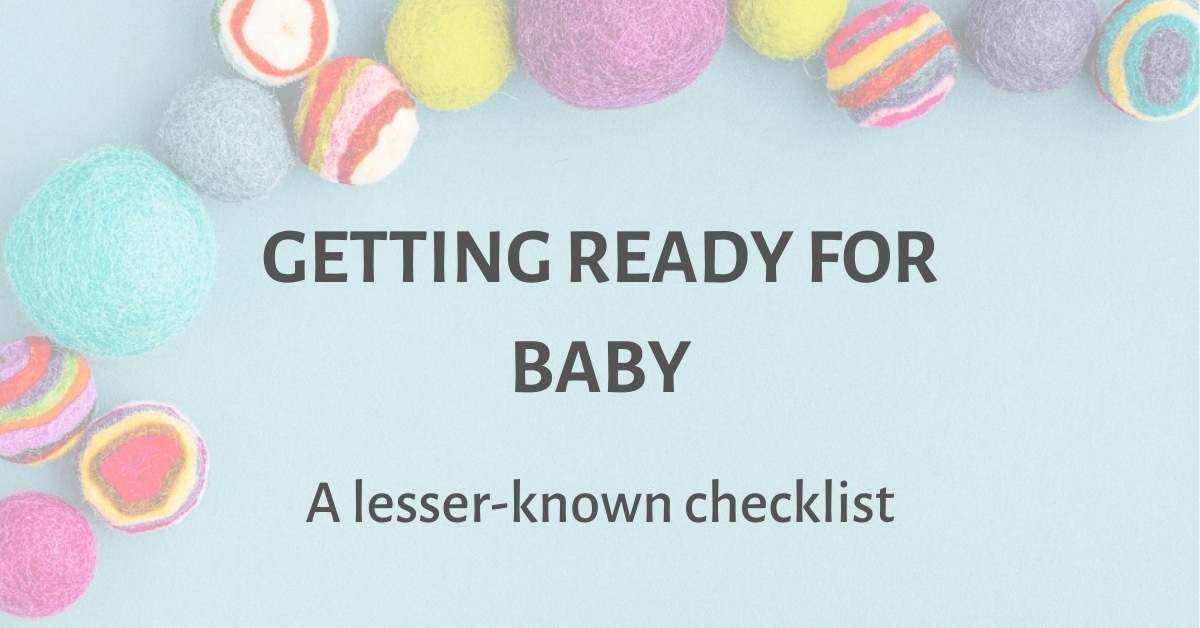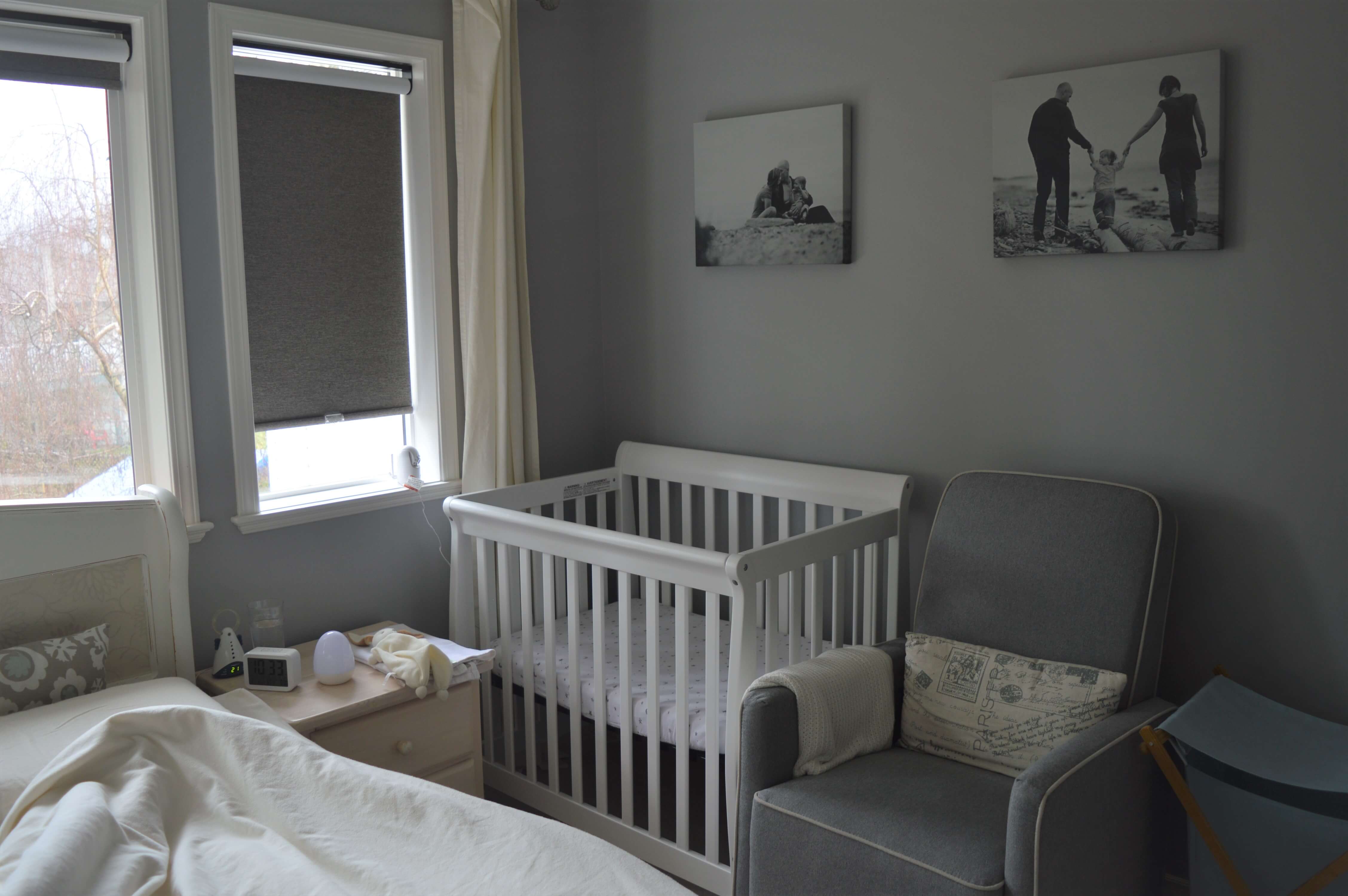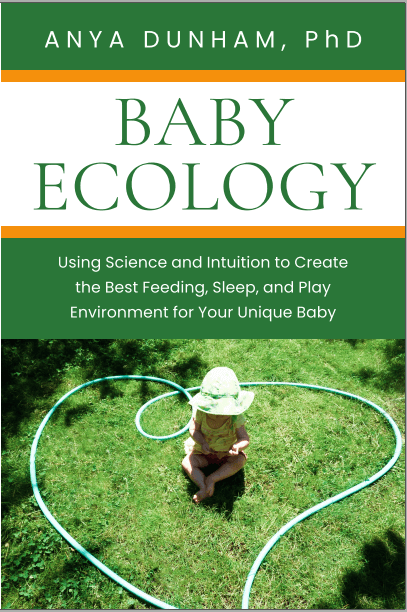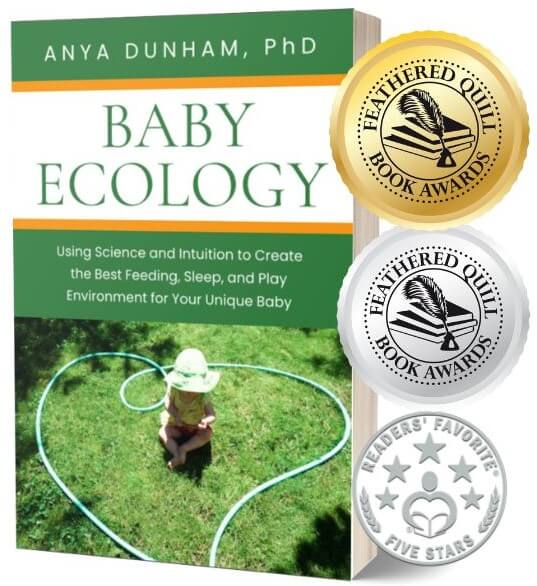Baby Ecology book is here! Learn more
Baby Ecology book is here!
- Home
- Getting Ready Checklist
Getting ready for baby checklist
by Anya Dunham, PhD
A lesser known getting ready for baby checklist: things to think about, find, and prepare while getting ready to meet your baby.

You are getting close to welcoming a very special person into this world: your baby. Do you feel like you have a lot to think about and prepare for?
Sample baby registries often recommend long lists of baby gear. But quite often these checklists are full of items you don't truly need - and yet miss the mark on other things you do need.
I would like to offer you a less common, but arguably much more important "getting ready for baby checklist": things for you to consider, prepare, and source out.
Download a short printable version (148 KB) ↓
Before your baby is here:
- Gather your support system
- Prepare your mind
- Get your home ready for baby
Let's take a closer look.
Getting ready for baby checklist
1. Gather your support system

~Consider a postpartum babymoon
Some cultures have a wonderful practice of a postpartum “babymoon” or “bubble” where mothers and babies stay home for 20 to 40 days after birth. Relatives help with chores while the mother rests and bonds with her newborn.
How can you create a postpartum babymoon if you live far from family, have older children to care for, or must return to work? Try to gather your support system, do some planning, and create your own version of a babymoon, if only for a short while. Only you can decide what it will look like and how long your “while” is.
Arrange your life in a way that allows for as much rest and bonding with your baby as possible. Think about who you would like to see during the early postpartum days and weeks - and who you don't want to see.
You don't have to have visitors if you are not up for it. Even if they are bringing gifts. Even if they are close family. Even if they insist.
Ask for what you need most. The early weeks are physically and emotionally demanding, but special and precious like no other.
~ Map out local resources
Find trusted local resources you might need or want, such as a lactation consultant, a postpartum doula, or a physiotherapist specializing in postpartum recovery. There is likely a local parent support group and maybe a babywearing community or lending library in your area. If you find these resources now, getting help and support once your baby arrives will be much, much easier.
(A baby carrier lending library was amazing for our family. It's such a great way to test out what carrier(s) work best for you and your family before you purchase any. I recently donated our carriers to our local lending library, to pay it forward - bittersweet!)
~ Discuss roles with your partner
If you will be parenting with a partner, talk about your hopes, ideas, and concerns about life with a baby as openly as you can. Studies show that key to engaged parenting is the time parents put into – and responsibility they feel for – the day-by-day caregiving.1,2 And moms tend to shoulder more work - and more stress - of parenthood.3
For millennia, birth and postpartum has been women’s work… but never of one woman alone. In today’s nuclear families men are invited to be full partners in birth and early parenting, yet many did not have role models to show them how. Sometimes one partner does not get involved enough and the other becomes overworked and stressed. Changing social policies that contribute to this issue is going to take time, but research points to three things couples can do to support each other in parenting.
2. Prepare your mind

There may be no way to fully prepare your mind for the enormous change of becoming a parent. But several key things can help you in the early weeks - and continue to matter for many years to come.
~ Practice mind-mindedness
Your baby will come into the world ready to connect and form relationships. She will need at least one person to form a secure attachment to: a strong and mutual emotional connection.4
Research shows that secure attachment forms best when parents are sensitive and mind-minded.
Sensitivity is probably not a new concept for you. Sensitive parents perceive, interpret, and respond to baby’s signals accurately, promptly, and warmly.
But have you heard of mind-mindedness?
Mind-minded parents view their babies not only as little bundles of joy and potential, but as whole people with minds of their own.5 You can learn about mind-mindedness, why it matters, and how to practice it before (and after) your baby arrives.
~ Learn about newborn temperament and crying
Our newborns are amazing in what they can already do at birth. But their physiological processes and rhythms are not yet organized or coordinated. They are working hard at staying calm and regulated so they can pay attention to people, things, and events around them.
Being calm is harder for some babies than others, for two reasons.
The first reason is something called neurobehavioural maturation. Some babies are born less neurologically ready than others. Their nervous systems are having a harder time adjusting to quick changes in sensory input such as light, temperature, and sound. These babies appear more “touchy” or “reactive”.6,7
The second reason is baby’s temperament: a set of tendencies each baby is born with that influence how he approaches, responds to, and interacts with the world.8 Some babies find it harder than others to adjust to life outside the womb. But remember that temperament is how a baby responds to the world (what he does); it is only part of baby’s personality (who he is).
3. Prepare your home

Although you probably don’t have to babyproof just yet, now is a perfect time to check on and improve your home’s overall safety. Make sure your smoke alarm has fresh batteries. Have emergency phone numbers handy.
~ A calm home environment
How will your baby experience your home? Think about your home environment from your baby's perspective. Your baby will very tuned into his environment right from the start.
Did you know that even before birth, a baby can recognize his mother’s voice,9,10 the sound of her native language,11 and even a story she recites frequently?12 A newborn prefers looking at human faces13 and can tell his mother’s face apart from anyone else's within hours of birth if he was also able to hear her voice.14 This means that his vision and ability to perceive patterns are already good enough to connect the voice he remembers to the face he now sees - pretty amazing, isn't it?
Being tuned into their environment helps babies learn rapidly. At the same time it makes them sensitive and easily overwhelmed, especially in the early weeks. And – you might find this surprising! – young babies learn best when they get more sleep and less stimulation.
Can you screen out some of the world’s intensity to help your newborn stay calm and begin focusing her attention? Consider decluttering, adding window drapes to soften light and sound, and moving away from background television. Consider switching to gentler, less fragrant and more environmentally-friendly home cleaning products.
(Hear me chat about creating calmer home environments on Wannabe Clutter Free podcast.)
~ A safe place for your baby to sleep and feed at night
Which sleep arrangement fits your family best: bed-sharing, room-sharing, or baby sleeping in his or her own room?
(Note up-to-date AAP recommendations.)
Each sleep arrangement has its benefits and risks. Changing approaches on the fly or because “nothing else works” can create unsafe sleep environments. Decide where your baby will sleep and make this space safe and comfortable in advance.
Next, think about how and where you will feed your baby at night:
- Are you are planning on feeding in a chair or sofa? Take utmost care to not fall asleep during feedings. Chairs and sofas create extremely unsafe sleep environments for babies15 because a baby can get wedged between the cushions or pressed against an armrest, all serious suffocation hazards.
- Will you bring your baby into your bed for feedings? Put the same consideration, thought, and careful planning into setting up your bed as you would for bed-sharing, just in case you fall asleep while feeding.
~ "Baby things": the minimum essential set
A newborn's needs are simple (but also all-consuming!): to be fed, safe, rested, and loved. Your newborn will need:
- Diapers and wipes
- Bottles and formula (if you plan on bottle-feeding formula) or bottles, a breast pump, and breastmilk freezer bags (if you plan on bottle-feeding breastmilk)
- 8 to 12 breathable one-piece sleepers or gowns. Those with zippers or snaps all the way down the front work best. There is a very good chance you will not want to pull even the cutest outfits over your newborn’s head in the early weeks!
- Large, soft flannel or muslin receiving blankets. They can also double as burp cloths, stroller and baby carrier shades, or nursing covers.
- A rear-facing infant car seat if you plan on driving with your baby. Learn how to adjust and use it properly ahead of time. Consult a car seat technician if you have questions.
(If you enjoy crafting, take a look at my list of 10 simple and useful DIY projects that will last through your baby's first year and beyond. This is a non-essential step, of course, but it can be a great way to relax while doing something you enjoy!)
Last but not least, if your baby will be going to daycare, you may need to choose daycare and get placed on waitlists before your baby is born. Here is a guide to help you choose the best daycare option available: Choosing Daycare Guide.
References
References
1. Gustafsson E, Levréro F, Reby D, Mathevon N. (2013) Fathers are just as good as mothers at recognizing the cries of their baby. Nature communications 4(1):1-6
2. Abraham E, Hendler T, Shapira-Lichter I, Kanat-Maymon Y, Zagoory-Sharon O, Feldman R. (2014) Father's brain is sensitive to childcare experiences. Proceedings of the National Academy of Sciences 111(27):9792-7
3. Yavorsky JE, Dush CMK, Schoppe-Sullivan SJ. (2015) The production of inequality: The gender division of labor across the transition to parenthood. Journal of marriage and the family 77(3):662-79
4. Ainsworth MS, Bowlby J. (1991) An ethological approach to personality development. American Psychologist 46(4):333-41
5. Meins E, Fernyhough C, Arnott B, Turner M, Leekam SR. (2011) Mother- versus infant-centered correlates of maternal mind-mindedness in the first year of life. Infancy. 16(2):137-65
6. Porges SW (1992) Vagal tone: A physiologic marker of stress vulnerability. Pediatrics. 90(3):498-504
7. Feldman R, Eidelman AI. (2009) Biological and environmental initial conditions shape the trajectories of cognitive and social-emotional development across the first years of life. Developmental Science 12(1):194-200
8. Rosenblum KL, Dayton CJ, Muzik M. (2009) Infant social and emotional development: Emerging competence in a relational context. Pp. 80-103 in: Handbook of infant mental health, 3rd ed. New York, NY, US
9. DeCasper A, Fifer W. (1980) Of human bonding: newborns prefer their mothers' voices. Science 208(4448):1174-6
10. Kisilevsky BS, Hains SM, Lee K, Xie X, Huang H, Ye HH, et al. (2003) Effects of experience on fetal voice recognition. Psychological Sciences 14(3):220-4
11. Moon C, Cooper RP, Fifer WP. (1993) Two-day-olds prefer their native language. Infant Behavior and Development. 16(4):495-500
12. Mondloch CJ, Lewis TL, Budreau DR, Maurer D, Dannemiller JL, Stephens BR, et al. (1999) Face Perception During Early Infancy. Psychological Sciences 10(5):419-22
13. Sai FZ (2005) The role of the mother's voice in developing mother's face preference: Evidence for intermodal perception at birth. Infant and Child Development 14(1):29-50
14. DeCasper AJ, Lecanuet J-P, Busnel M-C, Granier-Deferre C, Maugeais R. (1994) Fetal reactions to recurrent maternal speech. Infant Behavior & Development 17(2):159-64
15. American Academy of Pediatrics. SIDS and other sleep-related infant deaths: Updated 2016 recommendations for a safe infant sleeping environment. Pediatrics 138(5):e20162938
Using hundreds of scientific studies, Baby Ecology connects the dots to help you create the best environment for sleep, feeding, care, and play for your baby.
Warmly,
Anya


